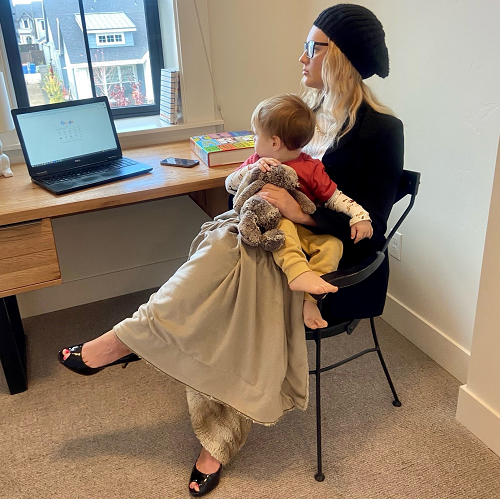 Nicole Counter was thrilled to start working at Amherst Madison Real Estate and Wilson Homes in Boise, Idaho, in 2020. Hired as an executive assistant, Nicole was excited about her future with the company. She hoped to become a real estate agent and felt proud to work at one of Idaho’s largest real estate brokerage firms.
Nicole Counter was thrilled to start working at Amherst Madison Real Estate and Wilson Homes in Boise, Idaho, in 2020. Hired as an executive assistant, Nicole was excited about her future with the company. She hoped to become a real estate agent and felt proud to work at one of Idaho’s largest real estate brokerage firms.
A few months before starting, Nicole gave birth to a son, adding to her family of four. She was nervous but excited about being a working mom after several years of staying at home to care for her children, and looked forward to pursuing the career goals she’d placed on hold.
As a breastfeeding mom of an infant, Nicole regularly expressed her breastmilk while she was away from her baby at her full-time job. However, she struggled to find a private location to express her milk. She went from using the company’s restroom to a shared office, but other employees still freely entered and left at will.
For Nicole, the lack of privacy was difficult, and expressing milk in a restroom where germs and waste were prevalent was even worse. However, these problems paled in comparison to how some of the company’s executives made her feel. Leadership greeted her with hostility and gave explicit direction to lower management that Nicole’s requests were to be ignored. They told her that she was embarrassing the men in her office. They also notified her that the sight of her breastfeeding equipment was inappropriate and unsettling. Yet they did not provide a solution.
“I felt so sad, hurt and shocked,” Nicole said.
Unfortunately, Nicole’s experience is one that many women across the country experience every day. Companies often relegate working mothers to express their milk in restrooms or other unsuitable places, and sometimes deny them the time necessary to perform this activity. With some exceptions, federal law requires that employers provide breastfeeding mothers with a clean and private space that is not a bathroom, shielded from view and free from intrusion, to express milk. The law also requires that these employers provide mothers with a reasonable break time for the mother to express breast milk for her nursing child for one year after the child’s birth.
In Nicole’s case, the U.S. Department of Labor’s Wage and Hour Division found that Amherst Madison Real Estate and Wilson Homes violated the Fair Labor Standards Act’s requirements on break time for nursing mothers, and that Nicole’s employers further interfered with her rights by retaliating against her through discrimination and hostility. The company paid Nicole $13,075 in back wages to remedy the violations, and will also ensure that future mothers get adequate breaks and a private, sanitary space to express milk.
Nicole has since earned her real estate license and is now writing her second children’s book. She is proud that she stood up for herself and paved the way for other working moms to feel supported, rather than shamed.
“I am so thankful that there are laws in place to support working mothers throughout our nation,” she said. “There are so many barriers for women, and this law helps to establish an environment of support and inclusion for working moms that is vital for a healthy workplace.”
For more information about the Break Time for Nursing Mothers provisions of the Fair Labor Standards Act and other laws enforced by the division, call our toll-free helpline at 866-4US-WAGE (1-866-487-9243).
Community Outreach and Resource Planning Specialist (CORPS) Karen Clark. Follow the Wage and Hour Division on Twitter at @WHD_DOL.

 U.S. Department of Labor Blog
U.S. Department of Labor Blog